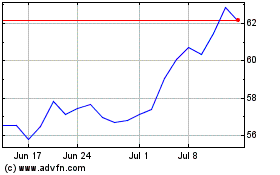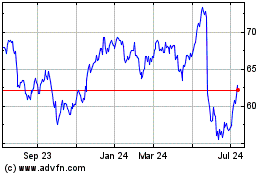The potential sale of German power-production assets by a
Swedish state-owned company to a Czech buyer is stoking public
fears that German taxpayers could face a multibillion-euro bill for
underwriting the transaction.
Sweden's Vattenfall AB last fall invited bids for its German
coal-fired power plants and mining assets. Two Czech suitors,
Energeticky a Prumyslovy Holding, orEPH, and Czech Coal Group, said
they submitted binding bids to Vattenfall on March 16. The bids
could trump a proposal from a rival German suitor, the
municipality-owned utility Steag, according to people close to the
matter.
EPH and Steag declined to comment, while Czech Coal and
Vattenfall didn't respond to requests seeking comment.
Vattenfall's operations are under pressure from falling energy
prices. Buying the assets also brings responsibility for shutting
the mines over the coming decades, an expensive proposition.
Those huge financial burdens have prompted all the bidders to
ask Vattenfall to provide the assets with billions of euros in cash
for the sale to go through, these people said. Because it is
unclear whether the unit's current cash pile of slightly more than
€1 billion ($1.18 billion) will suffice, the move could effectively
mean Vattenfall would be paying a buyer to take the operations and
related liabilities off its hands.
The insiders said that the Czech companies aren't seeking as
much cash from Vattenfall as rival suitor Steag. The German firm
submitted a proposal together with Australia's Macquarie Capital
that foresees transferring the lignite mines and power stations
into a foundation, with Vattenfall forking out more than €2 billion
in cash, they said.
Yet some politicians voiced concern that the bidder with the
most attractive conditions might not be the best one for taxpayers,
because a low cash injection from Vattenfall means taxpayers could
end up footing the bill for shutting down the mines and plants.
"If investors like EPH are buying [Vattenfall's German lignite
operations], I see the risk that they won't take care of the costs
for shutting them down," said Annalena Baerbock, a member of the
Green party in the German parliament.
If the money set aside to cover future liabilities isn't
safeguarded, those bidders may take the profits from the lignite
assets, and then let them go bankrupt, she added. While Mrs.
Baerbock said she expected costs of more than €10 billion to shut
down these mines, bankers see the resulting costs at roughly €3.5
billion.
Regardless whether a Czech or German suitor succeeds in the
auction, lawmakers are aware of the possibility that taxpayers
could be on the hook.
"Vattenfall mustn't be able to rake in billions in profits and
leave the burden with taxpayers," said Klaus-Peter Schulze, member
of the German parliament for the ruling CDU party.
Winning political support for the deal is necessary because
Germany's regional governments are responsible for granting mining
licenses and thereby have an influence over the potential
buyer.
Germany aims to meet roughly 80% of its electricity needs with
renewable energy by 2050, giving green energy priority on grids.
This will gradually phase out coal-generated power, making mines
obsolete.
The country's consumers will spend around €23 billion to
subsidize producers of renewable energy this year, according to
German grid operator Tennet.
Because electricity prices in Germany are falling, the market
value of the renewable power generated will be at roughly €3
billion a year, meaning German net spending of roughly €20 billion
on renewable energy.
Vattenfall in October 2014 announced it would divest its German
lignite operations as part of its strategy to cut carbon emission
and boost renewable sources of energy. Since then, electricity
prices in Germany have dropped to around €22 per megawatt-hour,
compared with €35 in late 2014. The situation is troubling all
German energy producers.
Since late 2014, share prices of RWE AG and E. ON AG, the
country's largest energy producers, have fallen by 60% and 35%
respectively.
Amid the grim situation, politicians are worried that closures
could result in a sharp rise in unemployment in eastern Germany,
where jobless levels are higher than in the rest of the
country.
Vattenfall has 8,200 employees in its German lignite operations.
The activities recorded €2.3 billion in revenues in 2014.
In a similar situation, EPH in September last year said it might
shut its UK-based coal-fired power unit, at Eggborough, by the end
of this month.
It added the power station, which provides 4% of the UK's
electricity, "requires additional funding of roughly £ 200 million
over the next three years to continue generating power, which is
financially unsustainable for the 53-year-old plant."
In a surprising U-turn, EPH in February postponed the
foreclosure by one year after it secured a new energy contract from
the U.K. natural-gas and electricity network operator National Grid
PLC.
Write to Eyk Henning at eyk.henning@wsj.com and Jenny Busche at
jenny.busche@wsj.com
(END) Dow Jones Newswires
March 29, 2016 05:35 ET (09:35 GMT)
Copyright (c) 2016 Dow Jones & Company, Inc.
National Grid (NYSE:NGG)
Historical Stock Chart
From Mar 2024 to Apr 2024

National Grid (NYSE:NGG)
Historical Stock Chart
From Apr 2023 to Apr 2024
